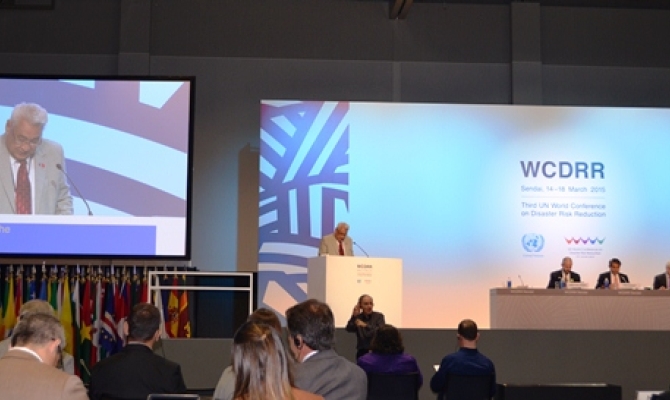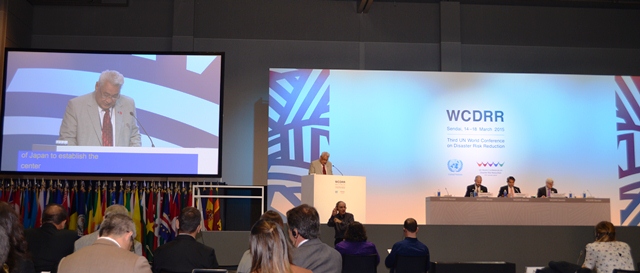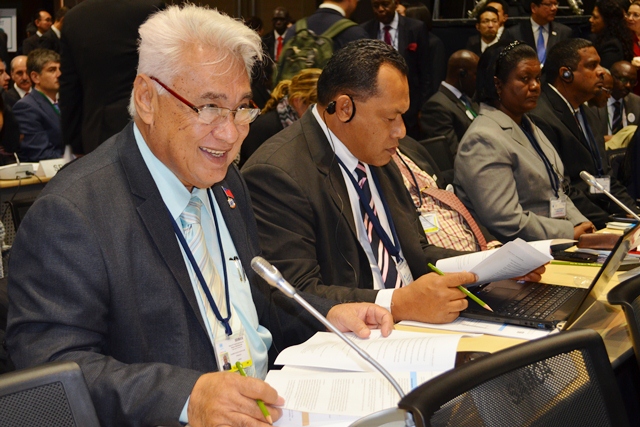
Climate Change Resilience

15 March 2015, Sendai, Japan - Samoa has called for a more coordinated effort to help build resilience in the Pacific islands at the Third UN World Conference on Disaster Risk Reduction in Sendai, Japan. The important role of partnerships is significant to Samoa, host of the 2014 UN SIDS Conference the theme of which was "Sustainable development of SIDS through genuine and durable partnerships."
"Being a Small Island Developing State with challenges of limited resources and an agricultural based economy, coupled with our exposure to disaster and climate risks, it requires a 'whole of society' approach to enable multiple stakeholders including government agencies, civil society, private sector, and development partners to build the resilience of small island nations like Samoa," stated Minister Faamoetauloa Lealaiauloto Taito Dr. Faale Tumaalii.
"We acknowledged the contributions of the Hyogo Framework for Action in assisting Samoa and the Pacific region to build stronger and more resilient communities. That said more effort is needed to strengthen and increase resilience."
The Hyogo Framework for Action 2005 – 2015: Building the resilience of nations and communities to disasters has five key strategic priorities was a guideline adopted by governments around the world to take action to reduce disaster risk.
Over the past two years a range of international consultations and preparatory meetings has led to a 'zero draft', the post-2015 framework for disaster risk reduction which is being considered in Sendai, Japan at the 3WCDRR. Over 10 Pacific island countries are in Sendai, to input and ensure their needs are met in this document.
Since 2005, disasters have continued to take a heavy toll. Over 700 thousand people lost their lives, over 1.4 million were injured, and around 23 million were made homeless as a result of disasters.
Overall, more than 1.5 billion people were affected by disasters in various ways. The total economic loss was more than $1.3 trillion. In addition, between 2008 and 2012, 144 million people were displaced by disasters.
Disasters are increasing in frequency and intensity, and those exacerbated by climate change are significantly impeding progress toward sustainable development.
It is in this that the Pacific Islands region are taking the lead to develop the "Integrated Strategy for Climate Change and Disaster Resilient Development" to build the resilience of the Pacific region to climate change and disaster risks in the context of sustainable development in the Pacific SID's.

"Samoa therefore urges that the new Global Framework for Disaster Risk Reduction establishes a strong mechanism to support implementation and monitoring of progress of this framework in our region and ensure alignment with regional reporting processes."
At the UN SIDS Conference last year, the formation of the Pacific Resilience Partnership was announced bringing together the climate change and disaster communities of practice as well as related sector experts to coordinate and strengthen island efforts to reduce vulnerability and build resilience to all hazards, whether slow or rapid onset.
The Pacific Resilience Partnership will oversee the implementation of the Strategy for Climate and Disaster Resilient Development, to ensure that actions are carried out in a coordinated and inclusive manner through the various stakeholder groups and within all key sectors at regional, national and community level.
The Minister of Samoa concluded his statement paying tribute to all those who lost their lives as a result of the 2011 Tohoku earthquake. He also asked people to join him in praying for our Pacific family in Vanuatu, Solomon Islands, Kiribati and Tuvalu, fellow Pacific communities who bore the brunt of the Category 5 Cyclone Pam.
"These events in themselves illustrate the uncompromising and sometimes the unpredictable nature of disasters in particular those caused by natural hazards and further intensified by the impacts of climate change. It further strengthens the call for renewed commitment and a sense of urgency to address disaster and climate risks."
The Third UN World Conference on Disaster Risk Reduction is hosted in Sendai, Japan from 14 - 18 March. The Secretariat of the Pacific Regional Environment Programme (SPREP) is a participating partner in the 3WCDRR alongside UNISDR, Pacific Islands Forum Secretariat, Secretariat of the Pacific Community and the University of the South Pacific together with Pacific Island Countries and Territories to raise awareness of the Integrated Strategy for Climate and Disaster Resilient Development in the Pacific (SRDP). New Caledonia is also attending this 3WCDRR. The Pacific island region is the first to bring together climate change and disaster risk reduction in an overarching framework.